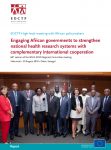National health research systems in Africa: developing a collaborative approach
EDCTP published the report on the EDCTP high-level meeting Engaging African governments to strengthen national health research systems with complementary international cooperation. The meeting took place in Dakar, Senegal, on 30 August 2018. It was organised as a side meeting during the 68th session of the WHO AFRO Regional Committee meeting. The objective of the meeting was to facilitate practical steps for countries to strengthen their national health research systems. This is necessary for country ownership of sustainable health research aligned with achieving the Sustainable Development Goals.
Go to report (PDF)

“As we to scale up investments on needs-driven research & development in Africa, it is critical that the results inform policy and practice. Improving national health research systems is key to connecting health research and health care. We need a systematic approach to collaboratively address gaps in these systems, but with clear country leadership and ownership.”
Dr Michael Makanga. EDCTP Executive Director
Representatives of WHO AFRO, the European Union and EDCTP al emphasised the importance of partnerships and political commitment in strengthening health research capacity and regulation in Africa. Dr Juliet Nabyonga-Orem (WHO AFRO) presented the findings of the NHRS surveys. She concluded that there were overall improvements in the health research systems in Africa between 2015 (when the first survey was done) and 2018.
“Health policies and practices in Africa should be informed by the national health research systems. This meeting provided an appropriate platform to discuss how strengthening these systems will make sure country-generated health research will inform national strategies for achieving universal health coverage.”
Prof. Moses Bockarie, EDCTP Director of International Cooperation Africa
Participants in the panel discussion included the Ugandan State Minister for Health in charge of General Duties, the Deputy Minister for Health of Mozambique, the Director-General of the West Africa Health Organization, the Policy Officer for EDCTP at the European Commission, and a representative of the Tackling Infections to Benefit Africa (TIBA). The panel discussion was moderated by EDCTP’s High Representative for Africa, Dr Leonardo Simão.
Main messages
The main messages from this meeting were:
- Political and financial support from individual African governments is vital to achieve regulatory governance and clinical research capacity.
- African governments need to engage and create an environment that a) uses results from health research, b) adapts national health policies to invest in new and better medicines, and c) makes these accessible through public health systems.
- The central role for clinical research to generate contextualised and feasible options was emphasised by WHO AFRO. Needed are more effectiveness studies conducted in real life environments and more product-focused implementation studies.
- In general, capacity building and skills development must improve including greater participation of women in health research.
Background
The meeting is part of an EDCTP project focused on supporting greater involvement of the 17 African EDCTP member countries in the EDCTP programme. Strong national health research systems would enable deeper involvement and offer possibilities for more country ownership and greater alignment with specific national health research needs of the EDCTP programme.
In collaboration with WHO AFRO, the first step taken was an assessment of the status of the national health research systems (HNRSs). In a workshop in Accra, Ghana in July 2018, EDCTP had engaged heads of government research units and representatives from the African EDCTP member countries. Thirty technical officers from these African member countries were trained to implement an assessment tool developed by WHO AFRO – the NHRS barometer – in their respective countries. The tool was discussed and adapted during the workshop. The results of this survey – expanded by WHO AFRO to all countries in the region – were presented at the meeting in Dakar.
More information
